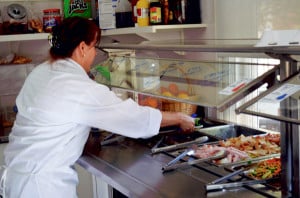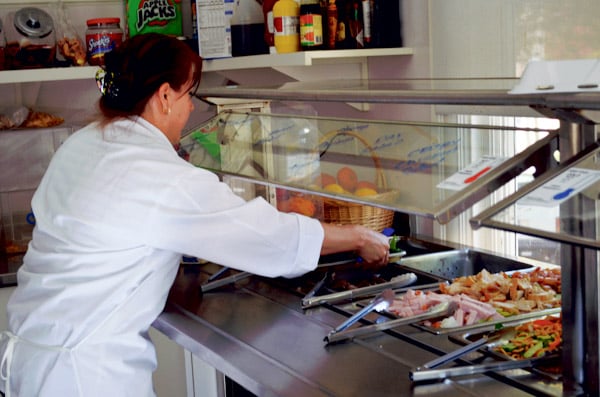Chef Billy Padilla has a unique approach to cooking: cook enough for twice as many people as you’re serving. This may seem wasteful, but the Kappa Alpha (KA) house never seems to have too much food.

According to KA kitchen manager Hunter Ploch ‘13, around 70 percent of Kappa Alpha residents are varsity athletes, making the double-portions much more understandable.
Padilla, who has been a chef in the KA house for nine years and a Row house chef for 11, follows a simple rule to satisfy KA’s 60 hungry residents.
“The more protein the better,” he said. “In the beginning, the guys just asked me to put out a lot of meat.”
Chefs play an integral role at Row houses, where students eat at their residences instead of at dining halls. Most chefs cook 10 meals per week, sometimes for 60 people or more, and residents can use the house kitchens to cook food on the weekends or eat leftovers.
“We always pack up our leftovers and put them in the fridge so that people can heat up a meal whenever it’s convenient for them,” Muwekma-tah-ruk Kitchen Manager Byron Walker ‘14 said. “It’s such a blessing.”
Student Organized Services (SOS), an independent organization founded by Stanford alum Nick Peters ‘94, is contracted by the University to both provide and manage Row house chefs. According to Aaron Buzay, director of operations for residential education, SOS ensures that “chefs prepare high quality food, comply with University policy and prioritize the needs of the individual house communities.”
When a Row house needs a new chef, SOS works with students in the house to fill the position, screen initial candidates and invite the top contenders to an interview.
“The interview includes the preparation of a sample lunch/dinner which students can try,” Buzay wrote in an email to The Daily. “This allows houses with specific needs (for example, related to an academic or ethnic theme) to emphasize their particular preferences.”
Openings for these positions are rare, with most chefs working in the houses for years at a time and some staying at Stanford for more than 15 years. Even though Padilla is clearly at ease in the KA kitchen and calls his operation “a well-oiled machine,” he still refers to himself as “one of the babies of the group.”
One reason why many chefs stay for so long is because they value the strong bonds they form with students who come through their house. Padilla said he gets to know most of the KA residents at the beginning of their sophomore year, making graduation three years later an emotional event.
Chefs form particularly close relationships with their kitchen managers, which is evident while listening to Padilla and Ploch banter back and forth and finish each other’s stories. Kitchen managers often have additional meetings with their chefs to plan menus.
“She’s just a wonderful lady,” Walker said about Muwekma chef Rosa Sandoval. “I love spending time with her and getting to know her.”
Kitchen managers also act as an intermediary between residents and the chef. Xanadu’s kitchen manager, David Raymond ‘13, said he doesn’t expect many complaints this year.
“The response to the food has been pretty awesome so far,” he said.
With the goal of making sure everyone is well fed and happy, many kitchen managers survey their residents at the beginning of the year to find out what types of food they like and to give the chefs an idea of what to cook.
“I’m planning on surprising some of the people by having their favorite dish for dinner,” Walker said. “If they talk about, ‘My mom used to make enchiladas with guacamole all the time, and that’s one of my favorite things to have,’ I am going to talk to Rosa about doing things like that.”
Kitchen managers also work with chefs to plan larger-scale events that the entire residence can look forward to, such as special dinners, in which chefs are paid overtime to cook gourmet meals.
Special dinner or not, meals at Row houses are typically highly anticipated by residents. For example, Raymond commended Fabian’s ability to cook a wide variety of meals, including Mexican food, curry and Chinese food. Most chefs are able to devote extra time and attention to every dish because, unlike cooks at dining halls, they are not under pressure to mass-produce meals.
Some chefs become particularly well known around campus for certain signature dishes, such as Padilla’s burritos. KA holds a burrito night every other Wednesday, which Ploch said has become “a pretty big thing.”
With signature dishes, special dinners, snack budgets and other perks, it’s easy to see why dining is a huge part of living in a row house. Raymond is already thinking about Xanadu’s first special dinner, which he predicts will be “a big bonding event” for the house.
“It’s nice to be able to, as an upperclassman, have a menu that is specifically responsive to student feedback and also damn good food.”
